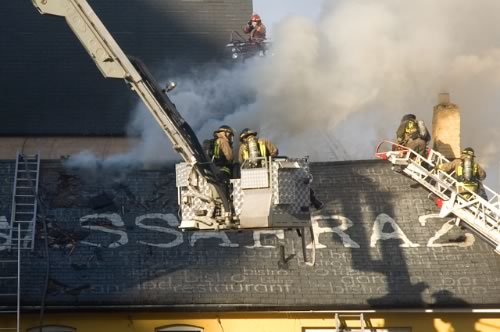[This has been cross-posted to my tech blog, Global Nerdy.]
Ferrarigate

If you’ve been following the technology blogs over the holidays, you’ve probably heard about Microsoft’s latest “guerilla marketing” move to promote Windows Vista: give some bloggers a free Acer Ferrari 1000 or Acer Ferrari 5000 laptop pre-loaded with Windows Vista to try out. The bloggers were given the laptops and had the option of sending them back once they were done with their review, given them away or keeping them.
This giveaway had an unintended consequence: a ruckus on tech news sites and blogs along the lines of Microsoft is bribing bloggers! What didn’t help are cases like Brandon LeBlanc, the blogger who failed to immediately disclose that Microsoft had given him his shiny new laptop in his initial post about it. (“I had intended to explain where this laptop came from in a more in-depth post,” he later wrote, but by then, his credibility was gone.)
In response to the kerfuffle, Microsoft is asking the bloggers to whom they sent laptops to either return them or give them away once they’re done with their reviews.
To which I respond: “Sure, but did you know I like to review things for a couple of years, just to be thorough?”
Full Disclosure
Yes, I am one of those bloggers.
A Ferrari 1000 laptop arrived at the office yesterday. I picked it up and thanks to the prior obligation of the deVilla extended family Christmas party, didn’t even to unpack it until late last night. Only this morning did I get a chance to fire it up and take it for a test spin.
(For the benefit of those of you who are hardcore fact-checkers, you can go to the DHL site and enter this tracking number — 7995316991 — to verify that it did indeed arrive only yesterday.)
A Quick Overview of the Ferrari
In the age of sub-$1000 notebooks, the Ferrari 1000 is a luxury model. It boasts some pretty decent tech specs:
- AMD Turion 64 X2 processor
- 1GB of RAM
- 160 GB hard drive
- 12.1″ WXGA glossy screen
- ATI Radeon Express 1150 graphics chipset
- Separate DVD-RW/CD-ROM drive
- 802.11 b/g WiFi
- Integrated 1.3 megapixel camera
- Bluetooth
- Bluetooth optical mouse
- Bluetooth VOIP handset thingy
- A black chamois that comes in its own little black case, for keeping the laptop nice and shiny
Like Porsche Design products — non-automobile items that have been styled following the automaker’s designs that allow you to overcompensate, even if you can’t afford their cars — Acer’s Ferrari laptops have been styled after the designs of Turin’s most famous export. Its glossy carbon-fiber top looks like a Ferrari interior panelling and the bright yellow Ferrari logo smack dab in the middle says “Hey, I paid a premium for this machine”, which is probably right — at the time of this writing, it retails at Tiger Direct for US$2000.
How I Got It
The laptop was sent to me by Aaron Coldiron, a senior product manager at Microsoft and manager of the community and blogger strategy for Windows Vista. I met him back in October at an invitation-only event in Toronto where he an a couple of guys from Redmond showcased some of Vista’s features. They handed out Release Candidate 1 of Vista at the end of the presentation, and I attempted to install it on my desktop computer at the office the following day. The results weren’t so hot, and I chronicled them in the following blog entries:
You’d think I’d be the last person they’d send a laptop pre-loaded with Windows Vista, but that’s what happened. On December 13th, I got an email from Aaron offering me one. Here’s the key excerpt:
It was nice meeting you back in October at the Windows event in Toronto. I was chatting with Claire Rankine on the Microsoft team about getting some hardware out to key community members, and we wanted to include you in this. I’d love to send you a loaded Ferrari 1000 courtesy of Windows Vista and AMD. Are you interested? Hopefully you’ll have a much better experience with this pc than you did with the upgrade experience.
This would be a review machine, so I’d love to hear your opinion on the machine and OS. Full disclosure, while I hope you will blog about your experience with the pc, you don’t have to. Also, you are welcome to send the machine back to us after you are done playing with it, or you can give it away to your community, or you can keep it. My recommendation is that you give it away on your site, but it’s your call. Just let me know your opinion on Windows Vista and what you plan to do with it when the time comes.
I wrote him back, saying:
I’d like to try the Ferrari and Vista and try it under what I call “Tech Evangelist working conditions” — that is, my day-to-day routine. That involves:
- Maintaining three blogs — the Tucows blog, Global Nerdy and The Adventures of Accordion Guy in the 21st Century
- Helping maintain Tucows’ web sites
- Writing technical articles and accompanying demo code, such as the “Duke of URL” (currently in PHP, but I’ll be expanding to C#)
- Doing developer relations with Tucows’ partners and vendors
- Doing work with TorCamp, ICT Toronto and other organizations who a promoting Toronto as a live/work/play hub for technologists
One of the first things I’d load on the machine are the Visual Studio Express kits and XNA Game Studio Express, which has really piqued my curiosity (especially the XBox 360 dev kits, as I am both a developer and an XBox 360 owner).
And in response, he wrote:
I haven’t read any reviews like what you’ve suggested so it should be fun. I’ll get this out to you next week.
And hence I got the machine.
Give It Away, Give It Away, Give It Away Now
As of Christmas eve, the mail server at work has been rejecting my email password, so I haven’t received the mail that Aaron has apparently been sending out in response to the flack about the giveaway. According to Marshall Kirkpatrick, it goes likes this:
No good deed goes unpunished, right? You may have seen that other bloggers got review machines as well. Some of that coverage was not factual. As you write your review I just wanted to emphasize that this is a review pc. I strongly recommend you disclose that we sent you this machine for review, and I hope you give your honest opinions. Just to make sure there is no misunderstanding of our intentions I’m going to ask that you either give the pc away or send it back when you no longer need it for product reviews.
I’ll email Aaron from my GMail account and see what he’s got to say. But like I said, I can review a product for a very long time.
A Dirty Little Blogger Secret
Okay, it’s not so dirty, and it’s not so secret either: one of the things that keeps me blogging are the perks. A little name recognition here, a couple of books to review there, free passes to wine-and-cheese events, pricey conferences and so on. I simply say up front that so-and-so is giving me free stuff or a free pass and to keep that in mind when reading my review or recommendation.
I’m with Hugh McLeod on this one:
Having both received and given out free stuff in the blogosphere, I’m not sure if I see what the big deal is. I certainly don’t have trouble with it ethically, as long as all parties are being upfront about it. And it seems like they are to me.
My experience with blogger product campaigns tells me that, if you’re just trying to turn bloggers into product pimps, you will fail. But if you see it as a way of starting interesting conversations with equally interesting people, your chances of succeeding are far greater.
While I’ve had Vista installed on my office PC for the past couple of months, it’s been second banana to my PowerBook. For the most part, the Vista-PC combo at work has been relegated to web browsing on another screen while I’ve been using the Mac to do all the real work.
By sending me a laptop with Vista pre-installed, Microsoft has actually managed to get me interested in Vista and giving it a thorough look-see to see if “there’s really a there there.”
So, in summary:
- I have in my possession a Ferrari 1000 laptop that Microsoft gave me to review.
- In the original email, I could keep the laptop, return it to Microsoft or give it to the community. It was recommended that I give it to the community.
- I have not signed any agreements with Microsoft, legally binding or otherwise. There are no strings attached
- I plan to blog about my experiences with both Vista and the Ferrari laptop.
- I hear that Microsoft is asking us to now either return the machine or give it away once we’re done reviewing it.
- I plan to review my machine for a good long time.
If Microsoft reeeeeally wants me to send the machine back, I will — if Aaron can beat me at an accordion-playing contest, Devil Went Down to Georgia style, to be judged by audience applause. I’d be cool with giving away the machine if I lost in such a competition.




